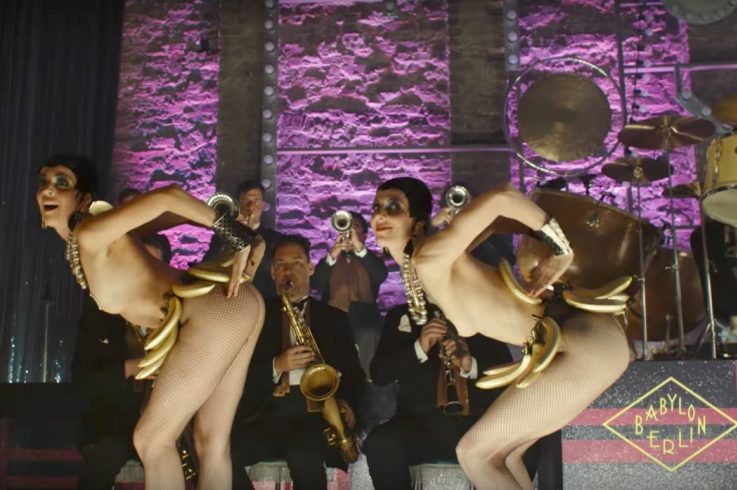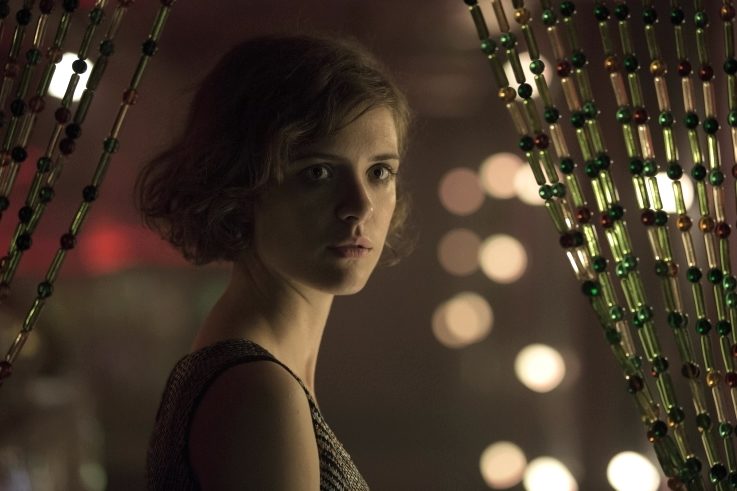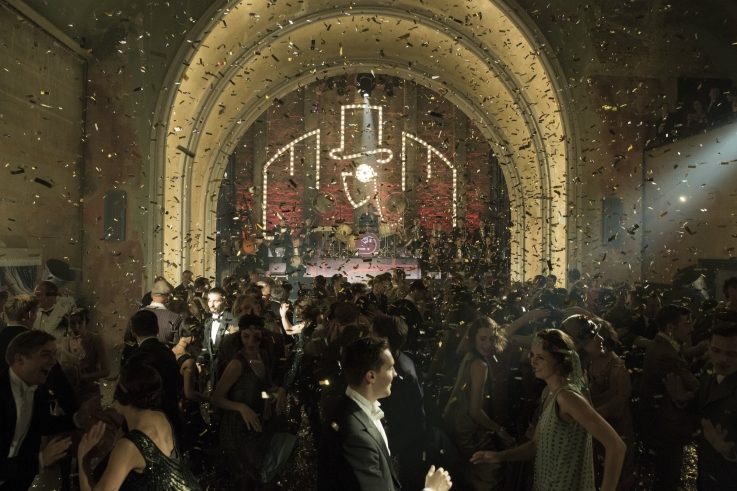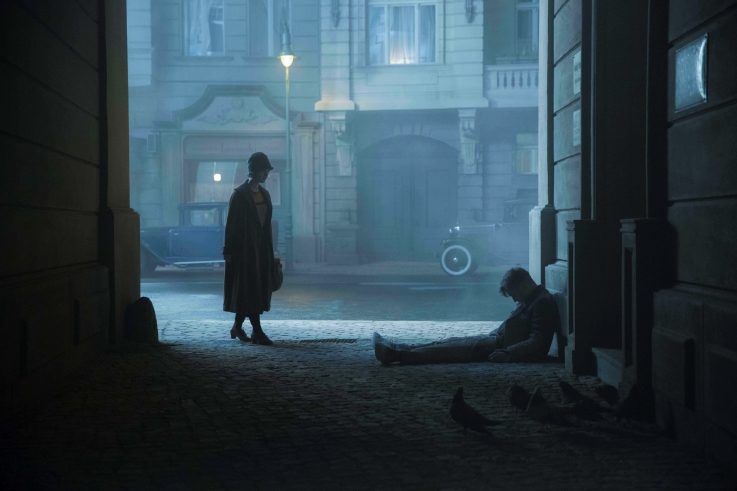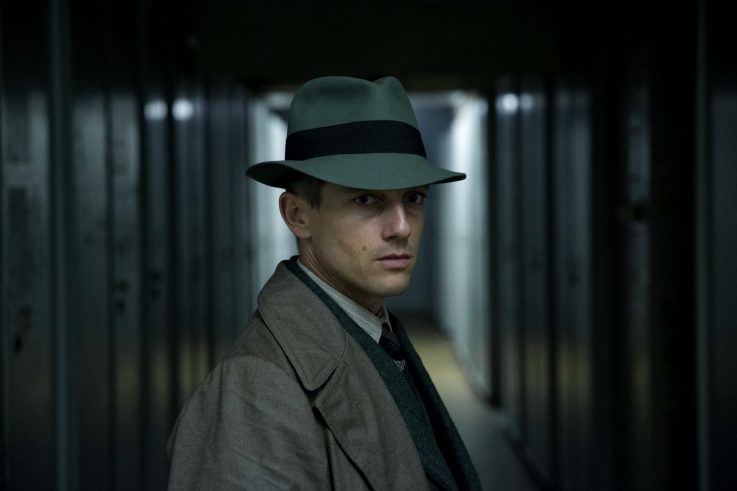German Series in the USA
Symphony of a Great City in 40 Parts: Babylon Berlin
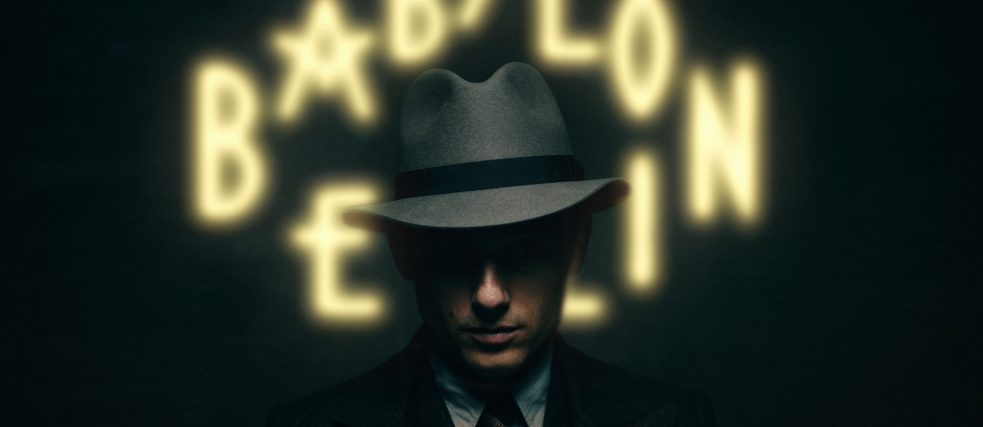
In the current boom in German TV dramas, no show has drawn more rave reviews worldwide than “Babylon Berlin”. Based on Volker Kutscher’s bestselling novels, the first season follows a police detective into the nightlife and political turmoil of Weimar Berlin. The series’ lavish budget is all there on the screen, but critics are swooning over far more than the extravagant production values.
By Mark Tompkins
In the current, unprecedented renaissance of German-language TV series, Babylon Berlin is the star attraction, a ratings smash in its native country and the UK. The show is airing in more than 90 other territories, including India and Africa – an unheard-of reach for a German series. While Netflix in the US doesn’t release viewing figures, the show has become a sleeper hit for the streaming service, thanks to a steady drumbeat of adulatory reviews from The New York Times, Vogue, The New Yorker, NPR and The New York Review of Books, among others.
How does a period-piece crime drama with subtitles captivate so many viewers? The answer is that in the hands of writer-directors Tom Tykwer, Achim von Borries and Hendrik Handloegten, “divine decadence” (to borrow a phrase from Sally Bowles) is made for binge-watching.
Come to the cabaret, old chum
The opening titles of Babylon Berlin are gorgeous but ominous, a perfect gateway to a heady re-creation of the Weimar Republic. In 1929, police detective Gereon Rath (Volker Bruch), Cologne’s finest, transfers to the vice squad in Berlin to track down a pornographer who is blackmailing politicians. Rath swiftly learns that to be a vice cop in Weimar-era Berlin is the most thankless of tasks: a decade of economic desperation and political unrest has fueled a culture of brazen amorality. By day, left-wing demonstrators clash with police and well-armed paramilitaries in the streets; by night, the city is electric as hedonists pack the clubs in pursuit of the latest thrills. Recklessly modern Berlin is both intoxicating and sobering.When Rath recognizes a corpse in the morgue as a Russian who had clearly been tortured, he finds that his bosses are oddly uninterested in the case. The deceased will prove to be just the first victim of a conspiracy that involves Stalin’s ambassador, a gender-bending nightclub diva and a cabal of Prussian aristocrats and generals.
The one ray of light for Rath in this urban labyrinth is police typist Charlotte Ritter, also known as Lotte (Liv Lisa Fries), a young woman whose charming manner masks a radical ambition to become the city’s first female homicide detective. Fearless Lotte comes from echt working-class Berlin. Her family’s dire poverty drives her to earn money any way she can, even if it means leading a double life – police detective’s girl Friday from nine to five and plying a less reputable trade in the city’s underground sex clubs after midnight. Lotte’s intimate knowledge of Berlin after dark makes her the ideal partner in Rath’s investigations: she leads him to the locales he might never find on his own
NO THREEPENNY OPERA, THIS
The advanced PR for Babylon Berlin focused on its budget. At a reported 40 million Euros, this is not just the most expensive German-language series ever made, but reportedly the most expensive non–English language series, period.
It’s good to know 40 million Euros still gets you something. Babylon Berlin looks spectacular – the producers clearly spared no expense or effort in recreating the Berlin of 1929, as the lavish sets and costumes make clear. Of the sets, the eye-popping standout is a huge Art Deco nightclub, the Moka Efti (based on a real establishment, the Berghain of its day), packed with extras in fancy dress.
Also noteworthy are exterior shots that show entire city blocks with no discernible CGI. Around 70 percent of the series was filmed on location during a 185-day shoot, and it all feels authentic. The period atmosphere is as thick as the local accents. No wonder the Berliner Zeitung ran a rave review of Babylon Berlin with the memorable headline “The great whore in best form.” Yet the show’s creators know how to make this Berlin feel lived in, and not like a curated museum of the past.
SOMEWHERE, FRITZ LANG IS SMILING
Babylon Berlin places the audience at the center of a whirlwind of cultural and political agitation. It’s a portrait of late-1920s Germany with some uncannily topical notes, but the show doesn’t stint on the pleasures of pulp fiction: mounting suspense, cliffhangers and a climactic shootout in a swanky Art Deco restaurant that would do Michael Mann proud. Throughout the series, the filmmaking is more inventive than in most feature films.
A passing knowledge of German history between the wars is helpful but not essential. Knowing that Nazism will soon overtake Germany gives the series considerable tension, but the showrunners are careful not to take a determinist approach to history. In the spring of 1929, the Nazis are just one faction among many vying for attention in a political-cultural landscape crowded with extremists and crackpots. (In “Red Berlin,” National Socialism struggled for votes in the 1928 elections.) Thus, the Nazis remain off-screen for most of the first 16 episodes. When the Brownshirts finally do appear, it’s an unsettling moment and raises the stakes for the continuation of Babylon Berlin.
The first and second seasons, of eight episodes each, were written as one complete story (covering the first novel of the Kutscher book series) and filmed as one continuous production. They premiered as one unbroken block, numbered 1-16, and have been broadcast throughout the world as one block. In addition, all 16 episodes of both seasons were made available simultaneously on Netflix. The second block of 12 episodes is therefore officially known as Season 3. The first three episodes of “Babylon Berlin” were seen by an average of 7.8 million viewers on ARD in 2019, achieving a 24.5% share and reaching a peak of 8.5 million. On Sky, it boasted the best ratings ever for a non-English series and was only beaten overall by the seventh season of “Game of Thrones.” -
Variety By the end of 2019 Babylon Berlin had cracked the 100-territory mark for distributor Beta Film, with the latest deals including Africa’s biggest subscription TV network M-Net and China’s Lemon Tree, and many different international networks including Netflix, HBO Europe, and Viasat picking up the series, marking an unprecedented success for a German production. The show's first season has also garnered a 100% Rotten Tomatoes critic score, a scarce seal of approval which has, well worth noting, also been achieved by the second season of Netflix Germany's
DARK and
DEUTSCHLAND 86.
The third season started filming in late 2018, with the principal cast and the creative trio of Tykwer, von Borries and Handloegten all returning. Filming was completed in May 2019 and broadcasting rights for the third season had been sold to 35 Countries before the filming had even concluded. On December 16th, 2019, the series' third season had its world premiere at the Berlin Zoo Palast and started broadcasting January 24th, 2020, initially on Sky 1. In the US, the third season launched on March 1st 2020 with all 12 episodes available on Netflix. The 4th season, aired in Germany in October 2022, and is available within Germany on the ARD Mediathek. In the USA, starting June 25, 2024, all four seasons will be available exclusively on MHz Choice after Netflix removed the series from their lineup– news we can raise a Berliner Weiße to.
MHz Choice, part of KLMT, LLC, a subsidiary of the Kino Lorber Media Group, is a subscription streaming service that offers viewers in the U.S. and Canada access to a library of the world’s best international television, with a focus on European mysteries and Nordic Noir crime and thrillers.
MHz offers Goethe-Institut patrons a 30% subscription discount for the first three months.
WATCH „BABYLON BERLIN“
In the USA:
MHz Choice (All 4 seasons, Available in German with English subtitles and dubbed in English)
In Germany:
Sky
Where Else Can You See the Cast of Babylon Berlin?
As streaming services bring worldwide attention to German TV series, Germany’s leading actors are becoming better known to audiences everywhere. Aficionados of Babylon Berlin can catch the show’s stars in other noteworthy series and films now streaming in the US (all with English subtitles or English audio):
Volker Bruch (Gereon Rath)
Generation War (2013), Netflix US
Young Goethe in Love (2010), Amazon Video
The Baader-Meinhof Complex (2008), Amazon Video
The Reader (2008), Netflix US
Liv Lisa Fries (Charlotte “Lotte” Ritter)
Counterpart (2018), Starz
“The Investigators” chapter of NSU German History X (2016), Netflix US
The Presence (2014), Netflix US
Peter Kurth (Bruno Wolter)
A Heavy Heart (2015), Netflix US
Good Bye, Lenin! (2004), Amazon Video
Leonie Benesch (Greta)
Howard’s End (2018), Starz
The Crown (2017), Season 2, Netflix (everywhere)
The White Ribbon (2009), Amazon Video
Lars Eidinger (Alfred Nyssen)
Sense8 (2017), Season 2, Netflix (everywhere)
Personal Shopper (2016), Hulu, iTunes, Showtime, YouTube
Clouds of Sils Maria (2014), Netflix US
Beat (2019), Amazon Video
Tracing the 1920s in Berlin
On visitBerlin.de visitors can find background information on the series and immerse themselves in the lifestyle of the Golden Twenties. If you are looking for the Weimar spirit in today’s Berlin, you will find plenty of tips on this themed website: tours, architectural highlights, such as the Berlin Modernist settlements and the Bauhaus Archive, dates for twenties parties such as the Boheme Sauvage, swing dancing in Clärchens Ballhaus or the annual Berlin Burlesque Festival in November.
